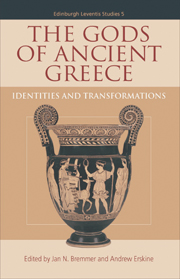Book contents
Preface
Published online by Cambridge University Press: 05 August 2013
Summary
The Greek gods are still very much present in modern consciousness, whereas the ancient rituals have been long forgotten. Yet even though Apollo and Dionysos, Artemis and Aphrodite, Zeus and Hermes are household names, they have hardly been at the centre of the modern study of Greek religion. From the most influential and innovative students of Greek religion of the last half of the twentieth century, Walter Burkert concentrated on myth and ritual, and Jean-Pierre Vernant made his name with studies of the psychological and sociological aspects of Greek culture. The gods were never the real focus of their attention. In fact, their lack of interest continued a situation that had already begun at the start of the twentieth century when classical scholars started to turn their attention to ritual rather than myth and the gods.
It is clear that a century of scholarly neglect of such an important area of Greek religion cannot be remedied by the appearance of a single book. That is why we have brought together a team of international scholars with a view to generating new approaches to, rather than providing a comprehensive survey of, the nature and development of the Greek gods in the period from Homer until late antiquity. Moreover, we have tried to go beyond the usual ways of handbooks which traditionally concentrate on the individual divinities.
- Type
- Chapter
- Information
- The Gods of Ancient GreeceIdentities and Transformations, pp. viii - ixPublisher: Edinburgh University PressPrint publication year: 2010



